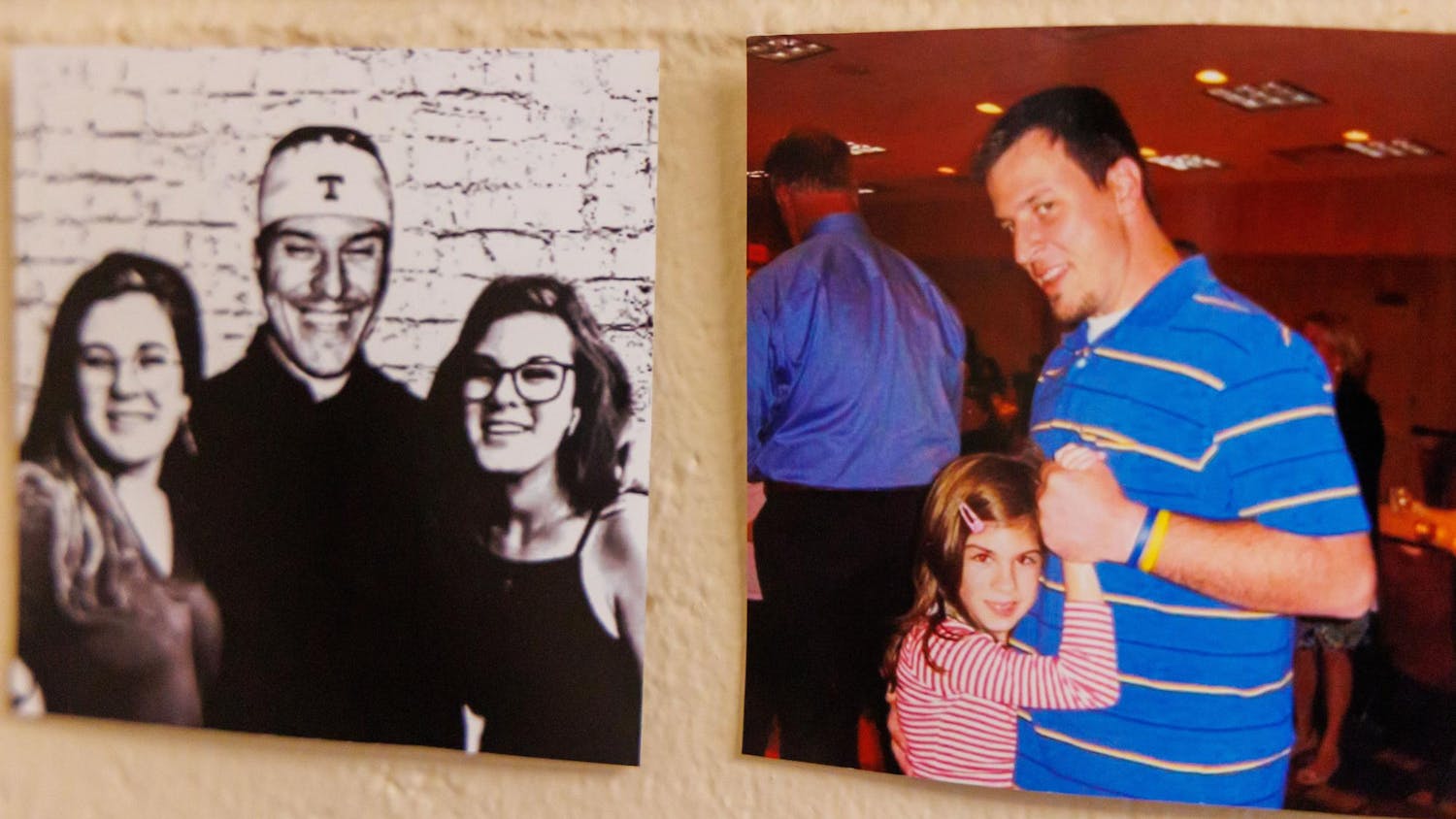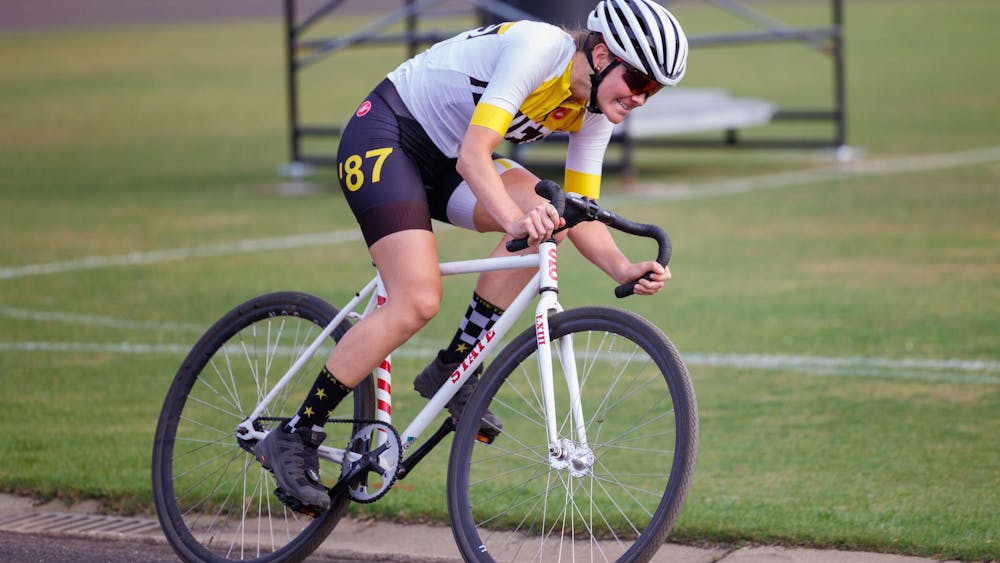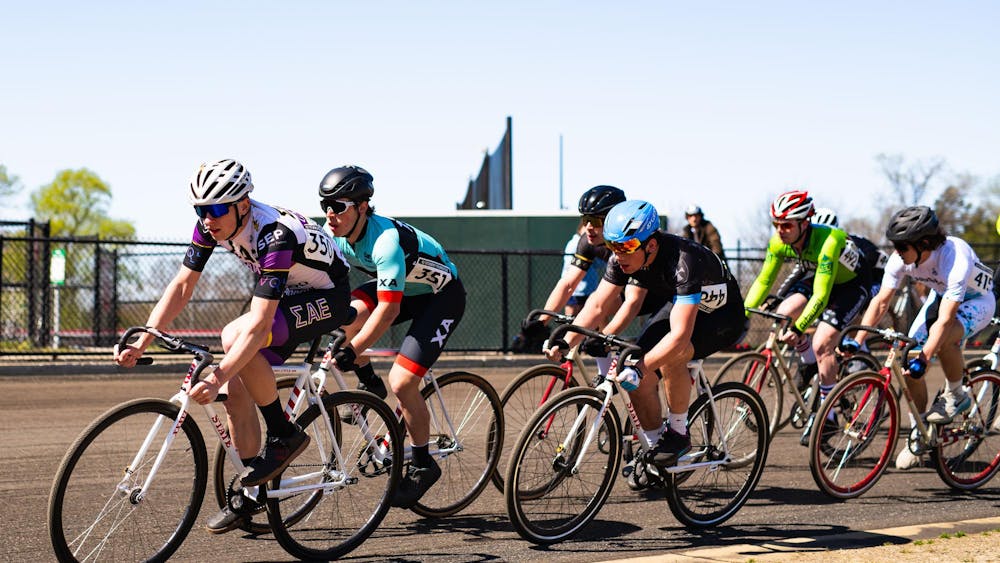Editor's Note:
This piece is not one that typically appears in the Indiana Daily Student. It is a personal feature by one of our staffers, Bailey Loosemore, detailing the sexual assault she experienced last fall and the effect it had on her life.
The essay is powerful. This is something that you, as readers, could find difficult to read or not want to read at all. But this is a story that often goes untold on college campuses.
By publishing this essay, we hope to bring light to this issue and break the silence.
***
For the past year, I’ve struggled to accept what happened to me that night last fall. At first, I couldn’t even define it.
Now, I boil it down to two words: sexual assault.
In the first days after, I couldn’t comprehend it. That couldn’t have happened to me. He was my friend.
I knew the statistics, but I never thought I’d be one of them. In the past decade, more than 700 sexual assaults were reported in Bloomington. Eighty percent of them were allegedly committed by acquaintances.
The problem’s not just in our community. The Rape, Abuse and Incest National Network reports that two-thirds of sexual assaults are committed by someone the victim knows.
I look at these numbers now and realize they’re not theoretical.
***
On Saturday, Nov. 6, I walked to a friend’s party four blocks from my house. I wanted a chill night, so I drank two beers and left before midnight.
The streets were silent, but my house felt even quieter. Both my roommates were out of town, and my footsteps echoed on the wood floor as I headed upstairs to my bedroom. I checked my phone as daylight saving time ended.
Downstairs, the back door opened, and familiar voices entered the kitchen. Though my roommates were gone, their two boyfriends had come to sleep in their beds — nothing unusual. Their boyfriends practically lived there, anyway.
It was common knowledge that our house was always open to friends. Usually, I didn’t mind the company.
The boyfriends went to bed, and I fell asleep in my room. At about 3:30 a.m., my phone vibrated on my pillow. Two other guys I knew were leaving the party I’d visited earlier and needed a place to crash. They’d already graduated and moved away from Bloomington. I told them I didn’t care; they could sleep on the couches.
I waited for them downstairs, wearing a high school T-shirt and a pair of boxers. The heat wasn’t on, and I shivered between yawns. The two friends walked to the front door, and I let them in. Only one bed aside from mine was open, and the guy who called claimed it.
The other guy stayed in the hallway. I had made out with him twice during the summer and had stopped him the second time before it went too far.
Now, in the hallway outside my room, I realized we hadn’t talked much since. Seeing him brought back the regret I had felt since that night.
He didn’t move. He asked to sleep in my room.
“I can’t sleep on couches anymore. We won’t even touch.”
Sleep pulled at my eyes. I didn’t want to argue.
“Fine.”
Reeking of beer, he took off his shirt and slid under the covers on the left side of the bed. I crawled in on the right.
He asked to snuggle, so I slid a few inches closer. He pulled me in until the lengths of our bodies were touching, face to face.
“We should kiss,” he said.
“I’m seeing someone,” I said.
“You don’t kiss your friends?”
“No, not usually.”
He tried to kiss me anyway. I told him to stop and moved back to my edge of the bed. He pulled on my right shoulder to turn me toward him.
He brought up the summer night when the two of us had made out.
“I just want to finish what we started,” he said. “Don’t you?”
He held the right side of my body down, his hand tight on my shoulder. Then he pinned down my right leg with his knee.
“No, stop,” I said.
I squirmed, but he was at least a foot taller than me, and stronger. He stuck his hand inside my underwear. His breath hit my ear as his hand touched me.
I froze. I couldn’t move, think, scream as I focused my eyes on the ceiling above my door. Finally, he let me go.
“You should take it as a compliment that I ignored you,” he said.
***
The next thing I knew, it was Sunday morning. The four guys were gone.
My stomach was in knots. For a second I wondered if the friend had really stayed in my room. But I could still smell his scent on the pillow next to me. Had I drank too much? No, only two beers, both several hours before the friend had arrived.
I ran to the bathroom and puked, then checked a clock. Work in 30 minutes. As I walked to Jimmy John’s, my body felt clammy but cold. I had taken a shower, but I still felt dirty.
In my mind, I ran through the previous night — the party, the walk home, the phone call at 3:30 a.m., the friend holding me down. I replayed what he said after.
“You should take it as a compliment...”
I told myself it was my fault. I had messed up, I thought. I had let him sleep in my bed.
My mind went back and forth. Even if I wasn’t to blame, I didn’t know how to explain what had happened or even what to call it. I was a writer, someone who told true stories for a living. But I couldn’t release this story from my mouth. I felt too ashamed.
After a week, it was too much to keep in. I started telling bits and pieces to friends. How he had wanted to snuggle. How I had said no, but he didn’t stop.
“Do you think it was sexual assault?” one girlfriend asked.
Others reacted with blank stares, quiet apologies. Nobody knew what to say; they’d never dealt with assault before. They told me to see a counselor.
No, I don’t want a counselor’s help, I thought. I want your help.
I wanted them to understand it. But how could they, when even I couldn’t find the right words? I felt more lost than I had before telling them. So, I stopped telling anyone.
For the next few weeks, I was stuck in a loop. I realized the assault hadn’t been my fault, but it still made no sense. He was my friend. How could he have done that?
The day before Thanksgiving, I called my mother, hard-core crying. At first, she couldn’t even understand what I was saying. I wasn’t going to make it home to Evansville. I couldn’t bring myself to leave my room.
My whole life I’d told my mom everything. So, when she drove up to get me, I couldn’t keep the assault a secret from her anymore.
Her response was the opposite of what I expected. “Why didn’t you do anything?”
I stared out the car window. I was asking myself the same question, but I didn’t want to hear it from her.
“I don’t know why,” I said. “I just couldn’t.”
But why didn’t I do something? I had just lain there. What was wrong with me? Three other guys were sleeping down the hall. I could’ve screamed and they would’ve come running. I could’ve fought back. Why didn’t I?
That day in the car, I couldn’t articulate an answer. But deep down I had known the truth all my life.
From childhood on, I’d had no self-confidence. Even as a junior in college, I still had trouble believing in myself — in my work, my writing, my relationships. And that night in my room, as he paid me his compliment, I’d lacked the confidence to fight back.
I didn’t think I was worth it.
***
During Christmas break, I gathered myself. When I returned to Bloomington, I cut back on my work hours, tried to rid myself of excess stress and moved into a studio apartment.
Until break, I had refused to consider counseling. But a few days into the spring
semester, I caved and began spending an hour a week with a counselor who specialized in sexual assault cases.
The counselor’s name was Ann. She had mousy brown hair and a quiet voice. Her office had a desk on one side and two armchairs on the other, plus a side table with a box of tissues. She sat in the chair closest to the window. I sat in the one closest to the door. I couldn’t look her in the eye.
It was the first time I’d told anyone the whole story. With family and friends, it felt like I was burdening them. But I could let Ann in without judgment. As the sessions went on and I told her everything, I felt lighter.
“Did you ever think about pressing charges?” she asked.
“No, I didn’t.”
“Why not?”
“He’s my friend.”
Ann said he wasn’t my friend if he’d done that to me, but I couldn’t see it like that. I didn’t want to ruin the guy’s life.
She wanted me to confront him. Not right away, but when it felt right. It would give me closure, she said. The idea made me nervous.
I could tell Ann cared about me and was trying to help. After a few sessions, though, I was getting frustrated. Everything I told her she explained away as a result of the assault, as though all my fears and actions were side effects of that one night.
“No, I’ve always been like that,” I would say. But she’d cut me off. “When you’re
assaulted...”
It felt like Ann wasn’t hearing what I was saying. I didn’t see how all the things I felt — the depression, the loneliness, the sense of loss — could be tied to the assault. I began to doubt the counselor’s advice, thinking I could handle the situation better on my own.
So, when she told me that I was getting better, that I only needed to see her once a month instead of every week, I canceled my next session.
That day, Ann called my cell phone. I let it go to voicemail and never called her back.
***
A few days later, I got my first reality check. The counselor had been more right about the assault’s effects than I’d wanted to believe.
While walking home from dinner, I lost my credit card and driver’s license. When I couldn’t find them anywhere, I broke down. I sat on my apartment floor throwing clothes, shoes and the contents of my backpack around the room.
Inside, I knew I was freaking out about something I could easily solve. I could call my bank in the morning. I could get a new license. But, once again, I had lost control. I had made a mistake I could have prevented.
I heard my mom saying, “Why didn’t you do something?” I could have screamed, I could have fought back, I could have said no one more time.
Shaking, I curled into a ball on the floor.
***
During the next month, I sleepwalked through my classes and work. I spent hours alone in my Bloomington apartment. I told my friends I was fine and tried not to think about the assault. I signed onto Facebook constantly, noting the people who were still close to the guy who assaulted me despite knowing he’d hurt me. I stood in front of people, but my mind was far away. I couldn’t see past the next hour.
Two weeks before spring break, I’d had enough. It was time to start taking care of myself. I turned off my phone, stopped checking Facebook, stopped texting people. I deliberately took a week to breathe, be quiet and think. I set up a routine that made each day easier to process — running three miles a day, making dinner instead of eating out, planning free time into my days.
I knew what I needed to do next. I emailed the guy, asking to talk. I didn’t have any expectations; I just wanted him to know what I felt.
The next day he texted me and suggested we talk that night. He was busy until 6 p.m. and would call after. My phone rang while I was at a dinner, so I went out to the sidewalk to talk.
I stood with my back against a brick wall.
I couldn’t figure out how to start. I paused, trying to picture the words before saying them.
“Do you remember that party when you stayed the night?” I asked. “Do you remember what happened?”
“Yeah,” he said. “I was drunk, but I remember some of it.”
I paused again, longer this time.
“I said no.”
“I know.”
“Why didn’t you stop?”
“I don’t know.”
“It was sexual assault.”
This time he paused.
“I know. I’m so sorry.”
The phone call didn’t last long.
“I hope we can be friends,” he said before hanging up. “Do you think we can be?”
“I don’t know.”
Leaning forward from the wall, I breathed. Again, I felt lighter. I had stood up for myself and told him what I thought, and he acknowledged that what he did was wrong. I wasn’t crazy for thinking I had been sexually assaulted. I could finally accept it.
A few weeks later, I went to a party at the same house as the one in November. About an hour after I arrived, I noticed the guy across the room. My heart beat faster; I hadn’t seen him in months. Then, I got a text message from an unknown number.
“Can I give you a hug?”
I knew it was him. By now, I’d surfaced from my depression. For the first time in months, I was happy. Surely I could manage a hug.
We met near the front door. He wrapped his arms around my shoulders, and I lightly put my hands around his back. I felt queasy. Then, we parted ways, not saying a word to each other the rest of the night.
As I stayed at the party a few hours more, knowing the guy was only a room away, I knew I’d forgiven him. But I’d also found the answer to his question. We’d never be friends again.
Now, nearly a year after the assault, I think about what happened less every day and continue to talk about it. While I struggled at first to define what happened, I don’t let the assault define me.
FINDING HELP
If you find yourself in a similar situation, don’t hesitate to seek help from the IU Health Center 24-Hour Sexual Assault Crisis Line at (812) 855-8900.
Note: Reader comments for this story were disabled given its sensitive nature. To share your thoughts with IDS editors email editor@idsnews.com.
Not another number - a personal definition of sexual assault

Get stories like this in your inbox
Subscribe





